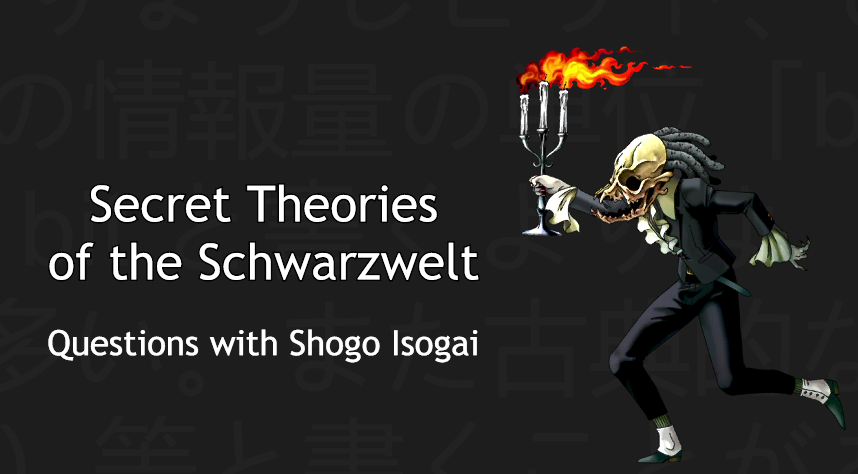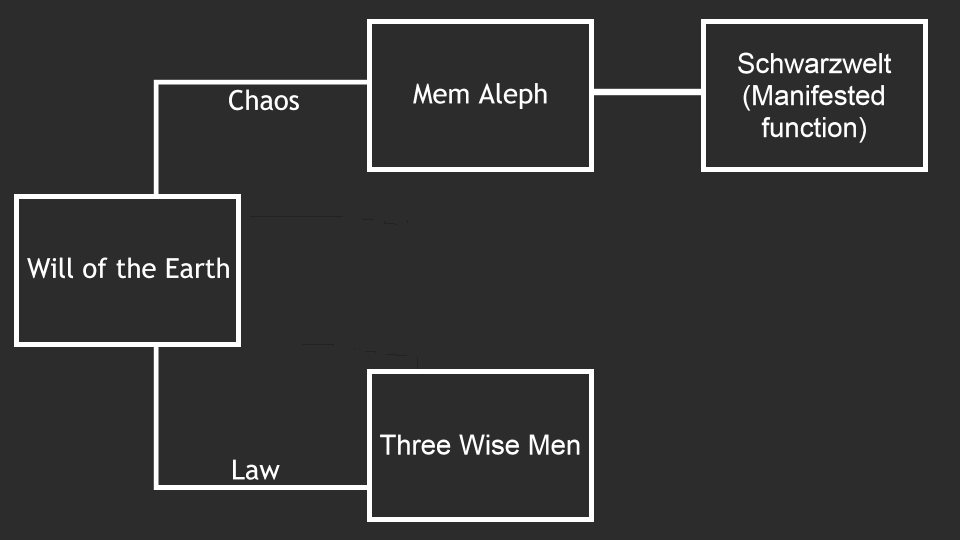Short break from work for a short translation. Isogai Shougo (Strange Journey scenario) shares a bit of the philosophy behind the Schwarzwelt, the human and data dimensions and alignments in the book Strange Journey: Schwarzwelt Reminiscenses. Thanks eirikrjs for the illustrations (UPDATE. For real now).

The interview is under the cut.
The nucleus of the Schwarzwelt, the Will of the Earth, has existed for a very long time, while the Schwarzwelt that engulfed the earth was born at the South Pole when that space in the form of a pillar appeared. Is this right?
If a human observer were to observe the time the Schwarzwelt appeared, they would say that it showed up on Earth all of a sudden. However, if you look at it from the point of view of the Will of the Earth, it is an internal mechanism, so it would be something along the lines of “to us, it feels like having the function of creating scabs through leukocytes and plasma” and “it existed before that”. …A summary of the things we have had until now is…
⩥The world is comprised of the “real dimension” and “data dimension”.
⩥The data dimension uses the data sent by the “conscious beings” from the real dimension in order to give shape to the “Will of the Earth”.
⩥Schwarwelt has the Will of the Earth shaped by the data dimension as its nucleus and, going back, it encroaches the real dimension. So now we can’t help but wonder – what was first? The Will of the Earth or the conscious beings? If we choose the beings, it would mean that humanity’s history is older than the Will of the Earth and we’d conclude it is recent history, but
1) the alternation of generations of the conscious beings takes place on the Earth of the real side
2) the same causality doesn’t apply to the Earth of the real side and the Will of the Earth on the data side
The chronology of humanity and the Will of the Earth should be crammed into the link of space-time continuum.
It is all rather difficult to understand. The special domain known as the data dimension seems to function on a principle of causality we cannot even fathom.
As I mentioned before, the main and original structural factor of the Will of the Earth and the Schwarzwelt is “data”. Inside the Schwarzwelt, there are, besides demons, dungeons made of strange symbols and super ingredients known as forma, but that variety exists because the Schwarzwelt used data as the main structural factor. Just as we and our world are made of particles (comprised of chemical elements), we can say that the things I mentioned are also made of factors known as data particles. There is a concept in quantum data science known as “quantum bit” – qubit, so I decided to make some use of it (well, at my own convenience…). The beings that exist in the Schwarzwelt are made out of “data” , and in addition to that, “data” from the conscious beings. The intelligent life that exists in the Schwarzwelt are demons from the legends and myths transmitted among humanity and a cause and effect situation: the strong negative feelings of humans turned into demons.
I can agree with the reason the Chaos forces led by Mem Aleph have demon forms. Then in opposition to that are the Law forces, for example the Three Wise Men?
The relationship between Will of the Earth, Schwarzwelt, Mem Aleph and the Three Wise Men can be explained like this.

Each ideology is missing something. Even in the game, Louis Cyphre brought a counterargument to the Three Wise Men’s vision.
You can say that Louis Cyphre/Lucifer is the main representative of Chaos in the Megami Tensei series, but we can also consider him the symbol of “free will”. He once received the One God’s favour, but found it unacceptable to be his subordinate and it is interpreted he fell due to his pride. He is considered the highest being of evil, but at the same time strongly attracts humans thanks to the strong “free will” that defines him (perhaps that is also they way he traps you as a demon). Even this game features his personality as the “patron of free will” ( we tried to make it so he might give hints, but never indications…). What he feared the most was the loss of free will, even if humanity were to be destroyed or even if Law forces were to gain hegemony.
Is there another power from another dimension, different from the Will of the Earth? You called the Law forces “visitors” earlier, but the Law forces, centered around Mastema and the angels, acted in the name of a different ideology compared to the Three Wise Men that came from the Will of the Earth. Now, please tell me about the characters on the human side. Still…there are a lot of characters who abandon their humanity. Let us start with Commanding Officer Gore, who became the Ubergestalt, the super being.
A character who wanted a chaotic omniscience and omnipotence. The Schwarzwelt offered him complete knowledge and he did not turn a blind eye to humanity’s mistakes, but decided to shoulder their purge…he has the role of conveying the truth of Schwarzwelt. Mem Aleph’s representative. However, he is not someone who blindly obeys Mem Aleph. He acts compliant to the knowledge he was granted. The image of a character who has an absurd amount of knowledge is impressive, not to mention that I do not have the same kind of intelligence. The gestalt part was inspired by the book of a writer named Sturgeon, and according to my notes…it was something along the lines of “the omniscience acquired by humanity”. The original quote has a very Law nuance to it – “One body where the consciousness of numerous people has coalesced”.
This is about Theodore Sturgeon’s “homo gestalt” from More Than Human. Let’s move on to Jimenez, who turned from human to demon. Can you tell us a bit more about Bugaboo?
He did physically become a demon, but at the same time he also released the chaos (passions, desires) that dwells in every human. His soul basically settled into the place it was supposed to. Before that, Jimenez used to have quite a lot of problems in his relationships with others, because of the discomfort he felt on a subconscious level. He felt discomfort with his own existence as a human, but was never completely conscious of it. This was how he reached the decision to become a demon, both on a physical and psychological level.
Even excluding Bugaboo, he had always needed to become a demon…Then what about Zelenin, who became an angel?
For her it was the conclusion she had reached after witnessing the limits of science and feeling disappointed with humans. She abandoned herself to the god of order and received his favour. Zelenin, who had previously used the power of science to help people, changed into the power of the god of law and ended up guiding people to the utmost limit. It is dangerous, but her love for humanity was consistent. The theme is the “failure of science”, more precisely, the following point of view: why is it that the development of science won’t necessarily make people happy? It feels like an approach born out of skepticism, that perhaps the present times wish for a system of god, similarly to the rehabilitation of Russian orthodoxy. At the same time, it meant more peace for her, since she was able to eliminate most of the passions that gave birth to her struggles or anguish. Zelenin losing her feelings hints how complicated the shpe of our ego is.
Science, which began when people started asking questions, and religion which began when people stopped having doubts and started believing…It is difficult to establish your own self when you find yourself between those two concepts. We also have Jack, with an incredibly human behaviour, among these people. That alone makes him a unique character. Can you tell me more about him?
One point shows how terrible human desire is: pursuing wealth and gains until Earth is on the verge of ruin. The pursuit of profits for oneself is the topmost behavioural principle. Co-existence and other concepts are trivial aspects (although in movies or novels about crises you will often see this type of scenes). The usual explanation is greedy humans (hate), but perhaps these people are actually ill (pity), and their behavioural principles cannot be changed. Another point is that they are the embodiment of an economic contract (Jack’s tendency is particularly strong). They are not worried about the fate of humanity or native countries, but regard with importance the contracts inside the squad and with the clients, since those are the relationships they can trust the most; it is a conclusion they have reached due to their life experience. They will not allow anyone, not themselves, nor anyone else, breach them. If they allowed this, their creed would be completely lost. Perhaps I can best summarise all this as “the strongest among human relationships is actually the financial one”…
This financial aspect is something people cannot avoid when it comes to relationships. Jack’s actions in Strange Journey are written as being “evil”, but I do believe we need to seriously think about whether we would end up doing the same thing or not. There are so many types of humans in the game, yet we also have the very human-like AI, Arthur. He seemed to have a role in helping everyone in the reconnaissance team think positively while working. You have conversations with Arthur in various places on the ship, does that mean there are several Arthurs?
Originally, it wasn’t a question of which one was Arthur, he was simply placed unevenly on the ship. As a result, you might think that the image that shows up during conversations is Arthur, but…I had in mind the following aspects regarding his character (?):
⩥outstanding mathematical and processing functions
⩥servant and subordinate of humans
⩥development interface which creates environments easier for humans to act in
⩥the limit of beings with no emotions
As mission commander, Arthur is responsible for presenting the plans, but he generally doesn’t have the right to make decisions. Decision making belongs to the commanding officer or to the entire crew. This is why Arthur can make analysis, but will not express his opinions. This is mainly due to the fact that the player is supposed to be the one who makes the decisions, part of the game’s appeal. Well, Arthur not having the right to decide in the end is because even though he is an evolved computer, the problem of his frame was not solved (the difficulty of having artificial intelligence deal with everything). As a computer, he states his opinions every time making mathematical, not emotional, decisions he has already processed. Moreover, he will not speak in a way that will emotionally affect his conversation partner. He creates environments in which things can be dealt with in a calm and collected manner. Basically, he will never say “Let us be in high spirits” or “Let us enjoy ourselves”. Still, he may be a computer, but he will act normally. Whenever Arthur gives assignments, he bases them on the premise that humans are “sensible beings” and he transmits them in an easy to understand manner (this is why he seems so human). Nevertheless, his functions cannot handle this “sensibility” too well, so he often ends up making incoherent or coarse remarks. We can also say that he has consulted coaching methods. I think he did look at processes such as “checking tasks” or “obtaining agreement and bringing out desire”.
We see the likes of Jimenez getting annoyed at Arthur’s remarks, but we can say that basically, Arthur’s detached words felt like a respite among all the fluctuating human relationships.
